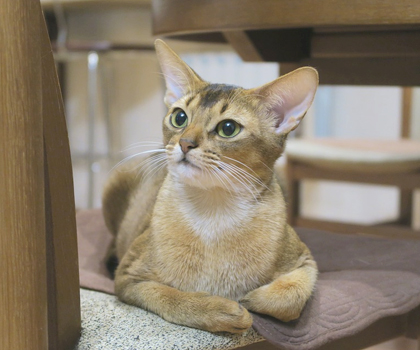
History
Abys today still retain the jungle look of felis lybica, the African wildcat ancestor of all domestic cats.The source of the name is not because Ethiopia, formerly Abyssinia, is thought to be the original home of these cats, but because the first “Abyssinians” exhibited in shows in England were reported to have been imported from that country. Recent studies by geneticists show that the most convincing origin of the Abyssinian breed is the coast of the Indian Ocean and parts of Southeast Asia. The first Abyssinians to be imported to North America from England arrived in the early 1900s, but it was not until the late 1930s that several top quality Abys were exported from Britain to form the foundation of today’s American breeding programs. Pricing on Abyssinians usually depends on type, applicable markings, and bloodlines distinguished by Grand Champion (GC), National or Regional winning parentage (NW or RW), or Distinguished Merit parentage (DM).
Description
In appearance, Abyssinians resemble the paintings and sculptures of ancient Egyptian cats which portray an elegant feline with a muscular body, beautiful arched neck, large ears and almond shaped eyes.
Grooming and Physical Needs
Size: This is a medium-size cat weighing 6 to 10 pounds.
- Grooming Needs: They don't require a lot of grooming. Because they have short, dense coats, they are very low-maintenance cats.
- Coat Type: Ticked coat and absence of tabby markings on the face, paws, and neck.
- Moulting: Very little.
- Exercise Needs: The Abyssinian cat is a very intelligent breed, so you must provide it with the opportunity to utilize this faculty. This is done through playful interaction.
- Average Life Span: 9-15
- Healthcare: Problems that may affect the Abyssinian include early-onset periodontal disease, hyperesthesia syndrome, patellar luxation, progressive retinal atrophy, pyruvate kinase deficiency (PKD) and renal amyloidosis.
Behaviour
- Family: The active and social Abyssinian is a perfect choice for families with children and cat-friendly dogs.
- Temperament: The Aby is a highly intelligent cat who loves to play and interact with people, so is high in energy and not a very floppy cat.
- Trainability: Abys are very good at training people to do just what they want them to do, less so the other way around.
- Sociability (Other Pets): Can be good with cat-friendly dogs.
- Meowing: Talkative and expressive, Abyssinians have a much quieter voice than other feline conversationalists like the Siamese, but they will make themselves heard.
Notes
Overall easy to care for.
All information courtesy of the Cat Fancier’s Association
